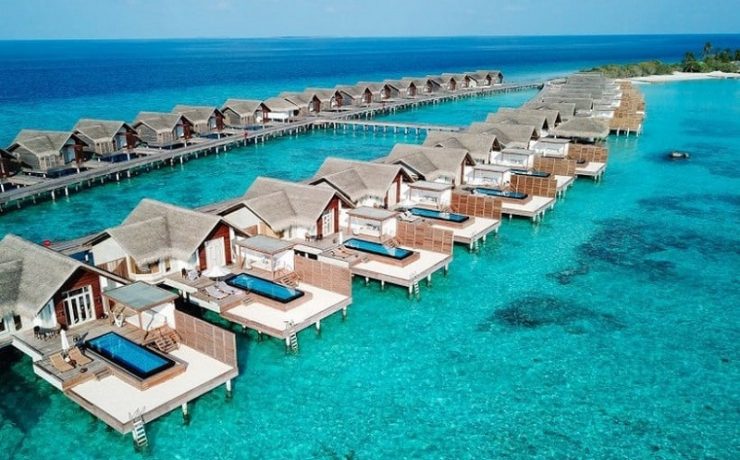AS a new decade approaches, the hospitality industry will evolve to meet changing aspirations, needs and guest behaviours. With travellers becoming more concerned with sustainability, wellness, equality and mindfulness, luxury hotel operators need to innovate their offerings.
Today’s discerning travellers not only expect hotels to provide relaxation and entertainment but also meaningful experiences that enrich their body, mind and soul.
Drawing on its expertise as a global hospitality leader with over 4,900 hotels and residences across 110 countries, Accor shares five emerging travel trends for luxury hotels in Asia Pacific. Be it transformative wellness getaways or sustainable farm-to-table meals, 2020 will mark a year of exploration, fuelled by a growing sense of responsibility and the desire to connect with destinations and local communities in more authentic ways.
At Fairmont Maldives Sirru Fen Fushi, guests can deep dive into the Indian Ocean for an inspiring introduction to marine life and discover phenomenal underwater art that helps rejuvenate the coral reefs. The Coralarium is the first and only coral regeneration project in the Maldives that comes in the form of an underwater art installation.
Veranda High Resort Chiang Mai – MGallery, Thailand offers a Green Elite Experience, inviting Accor loyalty members to embark on an eco-friendly journey, featuring delicious and nutritious farm-to-table meals. This includes a tour of the PUR farm with its founder, Tristan Lecomte, to learn how the project has helped to reduce greenhouse gas emissions while creating employment opportunities for locals.
Other activities include tree-planting and a waterfall excursion. As part of its commitment to sustainability, Accor is looking at introducing Green Elite Experiences across multiple hotels and resorts to immerse guests into the natural habitats surrounding its properties and allow them to learn more about how they can play a part in protecting the planet and its people.
The luxurious Sofitel Inle Lake Myanmar has introduced a new holistic Wellness Programme, to help guests connect with the destination and themselves and to learn how to slow down in an increasingly busy world. It comprises an extensive list of therapies, nutrition, educational wellness programmes, fitness activities and coaching, traditional treatments, and a range of fully curated programmes for every wellness need.
Each package is tailor-made to reboot and rejuvenate the body, mind and spirit. With a stunning UNESCO-listed biosphere as their serene backdrop, guests are given the opportunity to be transported to a state of complete physical, mental and social well-being while learning about Burmese traditions and treatments
In Singapore, Accor has partnered with brands focusing on reducing food wastage such as Treedots, Treatsure and The Food Bank to help the hospitality giant achieve its food waste reduction target of 30% by 2021 as well as further educating Accor hotels to be mindful of the community and their environment.
At Sofitel Singapore Sentosa Resort, Executive Chef Lorenz Hoja is working with Karana, a minimally processed meat alternative that uses organically sourced jackfruit, and positions itself strongly with regional cuisine with its’ pulled pork texture. Over the past few years, jackfruit has exploded onto the global food scene, emerging from relative obscurity to becoming an emerging plant-based staple that is here to stay.
Meanwhile at selected Accor Malaysia, Indonesia and Singapore’s hotel restaurant and bars, guests can enjoy a good cup of Gayo coffee, an Indonesian locally-grown Arabica coffee. Since 2016, the Group supports Indonesian coffee producers to diversify their crops and income streams by planting native trees in the area of Takengon, Central Aceh District, Sumatra in partnership with PUR Project (PUR Projet is a social business dedicated to regenerating ecosystems worldwide and fighting climate change through farmer empowerment and strengthening supply chains by insetting).
Fairmont Singapore and Swissotel The Stamford launched the industry’s first aquaponics garden, that not only caters to a rising demand among guests for fresh quality produce, but will also help the properties curb their carbon footprint, given that 90% of food consumed in Singapore is imported. Nestled on the rooftop properties, the property’s 450m2 aquaponics farm can produce 1,200kg of vegetables and 350kg of fish every month.
Aquaponics combines aquaculture – the growing of fish and other aquatic life – with hydroponics, which is growing plants without soil. It is a sustainable, pesticide-free solution to traditional methods with substantially higher yields while requiring less water, space and labour. This sustainable method enables to grow a full meal with just one system. [traveltext.id]
















